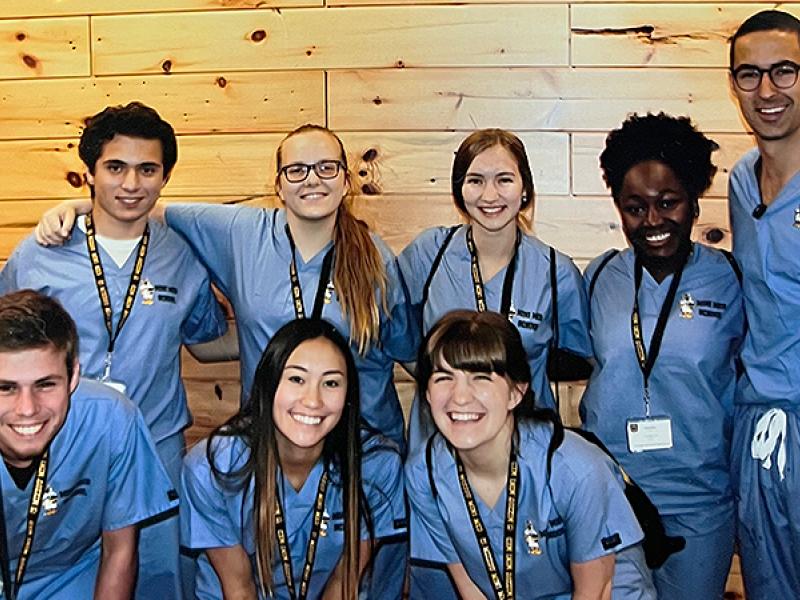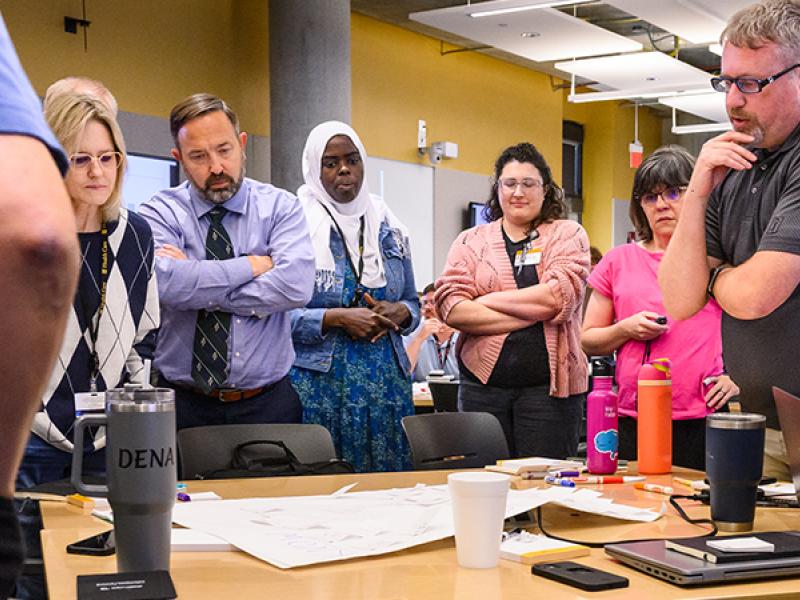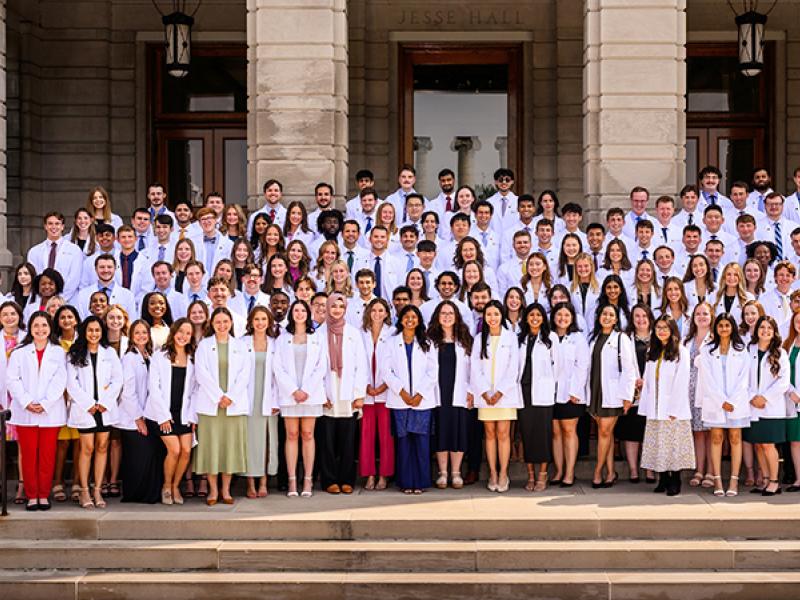Read about the program requirements and overview of our Premedical Rural Education Program (PREP) program.
PREP Science Courses: The science courses are designed to assist students applying and transitioning to medical school. These courses are developed by medical school faculty content experts. PREP students will take the science courses during the second summer enrolled in PREP. These courses build upon student’s previous knowledge and prepare PREP students for the rigor of medical school. The cost of attendance will be covered for PREP participants.
Additional Science Coursework: Since students will come into the program with varying levels of exposure and success in science coursework, in addition to the above PREP science courses, students will have the option to complete additional undergraduate science coursework through the University of Missouri- Columbia as advised by the PREP faculty advisor while in the post-baccalaureate programming based on transcripts and performance during PREP Science Courses.
Graduate Certificate Programs: Through a partnership with MU School of Medicine and the MU College of Health Sciences, PREP students will choose a 12-hour certificate program from the list below to enroll in during the spring semester in Year 1.
- Health Ethics
- Health Informatics
- Health Care Project Management
- Informatics for Public Health
- Life Science Innovation and Entrepreneurship
- Neuroscience
- Public Health
In addition to the PREP Science Courses and graduate certificate coursework, postbaccalaureate students are required to complete the online PREP Course: Introduction to Rural Medicine over the two years consisting of multiple asynchronous modules. The modules focus on both medical and public health issues affecting rural populations to further prepare them for rural practice and enhance their application to medical school.
PREP Course: Introduction to Rural Medicine: Students will be required to complete modules 1-3 and choose four topic-based modules to complete during PREP.
- Module 1: Introduction to Social Determinants of Health (required)
- Module 2: Introductory Methods (required)
- Module 3: Community Health Needs Assessment (required)
Topic-Based Modules (students choose four to complete):
- Opioids/Substance Use Disorder
- Adverse Childhood Experiences (ACEs)
- Telehealth
- Relationships as a Health Issue
- Elder Mistreatment
- Intimate Partner Violence
- Food Security as a Social Determinant of Health
- Health Literacy
- Health Inequities
PREP Workshop: Writing a personal statement, preparing an application, and interviewing for medical school. Participants are required to complete the PREP Workshop, which includes a three-week online component and a one- or two-day in-person session at MU School of Medicine. The workshop previews the medical school application process through AMCAS, explores the importance of recommendation letters, and helps students develop strong interviewing skills. Students will receive feedback for personal essay submission and participate in mock interviews. The cost of attendance will be covered for PREP participants.
Physician Shadowing: Participants are required to enter a mentoring relationship with a rural physician and log at least 20 hours of shadowing with their mentor per program year. The mentor is identified and selected by the participant.
Health-Related Activities: Participants are required to log 20 hours of other health-related experiences per program year. These experiences may include but are not limited to health research, rural health lectures, shadowing other health- related staff, or work experience as a scribe, phlebotomist, hospital aid, etc.
Community Service: Participants are required to log eight hours of community service per program year. The service activity is the participants choice.
Rural Health Lecture Series: Participants are required to attend two rural lectures per program year. The Rural Health Lecture Series is a quarterly series focusing on relevant rural health topics. In this series, attendees hear from experts in rural healthcare on topics including models of addressing behavioral and women’s health in rural areas, rural leadership and community engagement, the impact and management of substance abuse disorders in rural areas, and the use of telemedicine to expand access to care for rural populations.
Participant Conduct
Failure of a participant to comply with program requirements may result in participant dismissal from the program and a reduced or revoked stipend. If a PREP participant is accepted to medical school with a start date during the PREP program. The participant would automatically be withdrawn from the program and may result in a reduced stipend amount.
PREP Course: Introduction to Rural Medicine: Students will be required to complete modules 1 & 2 and choose four topic-based modules to complete during PREP.
· Module 1: Introduction to Social Determinants of Health (required)
· Module 2: Introductory Methods (required)
Overview of PREP Requirements by Year
Year 1
Summer Semester
- PREP Orientation: An orientation to PREP and the program requirements
- Complete the Learning and Study Strategies Inventory (LASSI)
Fall Semester
- PREP Course: Intro to Rural Medicine
- Module 1: Introduction to Social Determinants of Health
- Topic-Based Module 1
- MCAT Prep Course (if applicable)
- Physician shadowing, health-related activities, community service, and rural lectures
Spring Semester
- PREP Course: Intro to Rural Medicine
- Module 2: Introductory Methods
- Topic-Based Module 2
- Graduate Certificate Course (3 credit hours)
- PREP Workshop (In Person): Writing a personal statement, preparing an application, and interviewing for medical school
- Physician shadowing, health-related activities, community service, and rural lectures
Year 2
Summer Semester
- Graduate Certificate Course (3 credit hours)
- PREP Science Courses
Fall Semester
- PREP Course: Intro to Rural Medicine
- Topic-Based Module 3
- Graduate Certificate Course (3 credit hours)
- Physician shadowing, health-related activities, community service, and rural lectures
Spring Semester
- PREP Course: Intro to Rural Medicine
- Module 3: Community Health Needs Assessment
- Topic-Based Module 4
- Graduate Certificate Course (3 credit hours)
- Physician shadowing, health-related activities, community service, and rural lectures
This program is supported by the Health Resources and Services Administration (HRSA) of the U.S. Department of Health and Human Services (HHS) as part of an award totaling $16,000,000 with 10 percent financed with nongovernmental sources. The contents are those of the author(s) and do not necessarily represent the official views of, nor an endorsement, by HRSA, HHS, or the U.S. Government.





